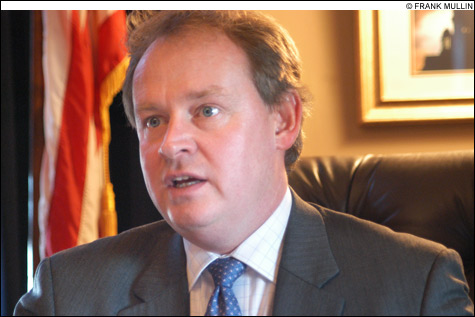
IT’S STILL THE ECONOMY: Although the Speaker cites the importance of job growth, state leaders have their work cut out in making this happen.
|
It was no big surprise when House Speaker William J. Murphy recently presented his wife, Stacey, with a bunch of roses — as thanks, he said, for the nights he had missed dinner while working late at the State House.
Yet after winning election to his third term as speaker on January 2, Murphy flashed a knack for political symbolism by pulling out another bouquet, this one for First Lady Sue Carcieri. He offered the gift, as he gamely told the House chamber, since Governor Donald L. Carcieri will miss his share of dinners while working with the legislature in the months to come.
Coming after Gerald R. Ford’s death, there was a sincere, if somewhat perfunctory, quality to the talk of bipartisan cooperation, a theme sounded earlier in the day by the Republican governor. Murphy’s reach across the partisan divide seemed unusual, however, for a man who now enjoys an unquestioned hold on what is widely considered the most powerful post in state government. So the question becomes one of how the veteran lawmaker from West Warwick will use his growing authority and influence.
It’s no small matter. In sharp contrast to the institutional chumminess that marks the opening of the legislative year, and such warm-hearted moments as a toast to Frank DiPaolo Jr., the 100-year-old doorman of the House lounge, Rhode Island faces serious challenges.
Topping the list is the $105 million deficit in the current budget, as well as the $250 million structural deficit for next year. The consensus is that state leaders will be unable, unlike in some previous years, to pull a rabbit out of a hat to magically plug these gaps.
In another inauspicious indicator, a story about how young, ambitious Rhode Islanders are leaving the state, because of a lack of jobs and the high cost of living, played on the front of the ProJo on the morning of the opening House and Senate sessions of 2007.
The magnitude of these problems could explain why, at least for now, legislative leaders and the governor are making nice with one another.
A hybrid at the helm
Murphy’s leadership is something of a hybrid. He’s an Irish Catholic social conservative who last year backed tax cuts for the rich, as well as the legalization of medical marijuana (he expects the state law, which has a sunset provision, to be made permanent in this session). By contrast, the speaker’s majority leader, Gordon Fox (D-Providence), is an openly gay man of color.
In another sign of his varied appeal, the genial Murphy gets largely kind words from both the editorial page of the ProJo — which offered him a surprisingly enthusiastic endorsement during his 2005 leadership challenge — and from the social advocates who expect legislative Democrats to restore the budget cuts made by GOP governors.
The 44-year-old speaker, a criminal-defense lawyer who operates a busy Providence-based law practice with partner Mark Fay, joined the General Assembly as part of a very large incoming class in 1992. A leadership fight, between conservative John Harwood (D-Pawtucket) and liberal Representative Russell Bramley (D-Warwick), was coming to a head at the time.
As House freshmen, Murphy and Fox backed Harwood for speaker, and his victory was followed by major cuts in social programs — a circumstance that legislators will have to at least consider this session because of yet another state revenue shortage.
Unlike the seemingly unchanging nature of the state’s budget problems, though, Murphy has been a different kind of speaker than Harwood: more accessible and less autocratic, with more of a professional life beyond the State House, and without the kind of controversies that brought unflattering publicity to his predecessor.
Reform school
Like apparitions, the portraits of former legislative leaders — many who have fallen prey, sometimes in sensational form, to their own hubris — line the walls of the State House.
Yet Murphy, who speaks haltingly during an interview, suggests he will be able to avoid the self-inflicted pratfalls that have ensnared some of his predecessors. “I’m not the type of person who has a huge ego,” he says, describing the size of his ego as nonetheless “healthy.” “I’m not looking at this position as one in which I’m trying to enhance my power.”
Such disclaimers notwithstanding, Murphy has suggested a self-imposed eight-year term limit for his tenure as speaker. He cites the importance, as with professional athletes, of knowing when to move on.
Unlike Harwood, Murphy has accepted separation of powers, a long-in-coming reform that diminishes the patronage power of legislative leaders since the governor, rather than the speaker and Senate president, will have the authority to choose the makeup of numerous boards and commissions.
The change in leadership also explains why the question for a Harrah’s-Narragansett casino, which would have been built in Murphy’s home community of West Warwick, was placed on the statewide ballot — where it was overwhelmingly rejected — this past November. Harwood, whose law partner represented Lincoln Park, was seen as a staunch casino opponent.